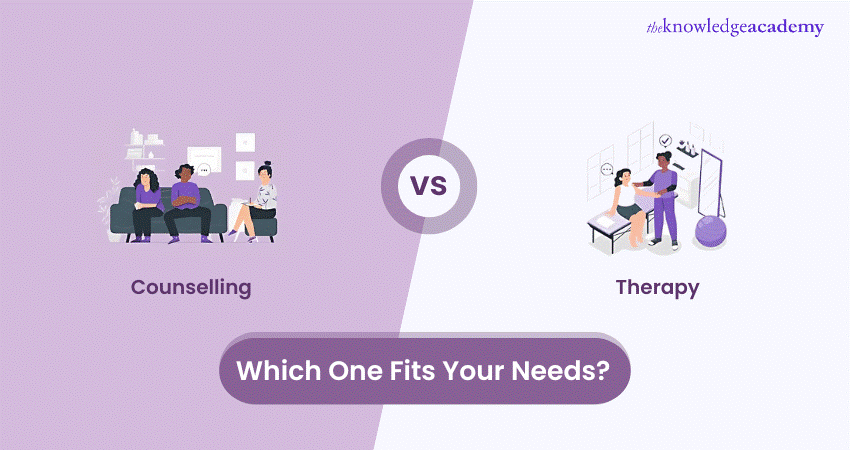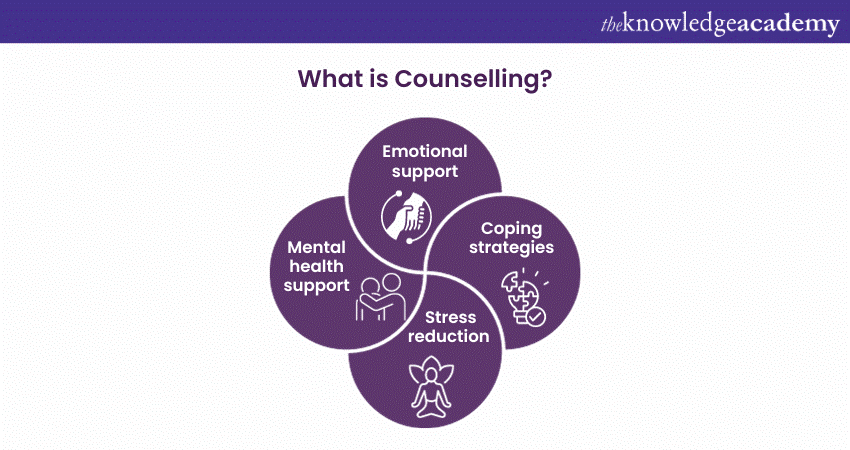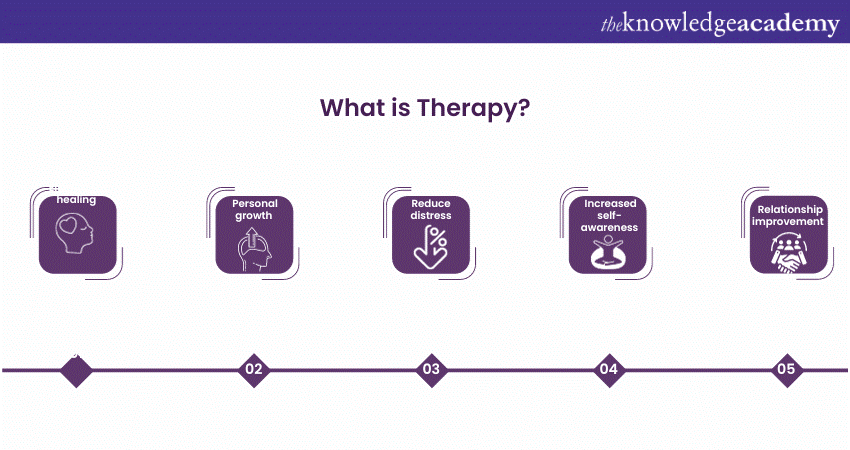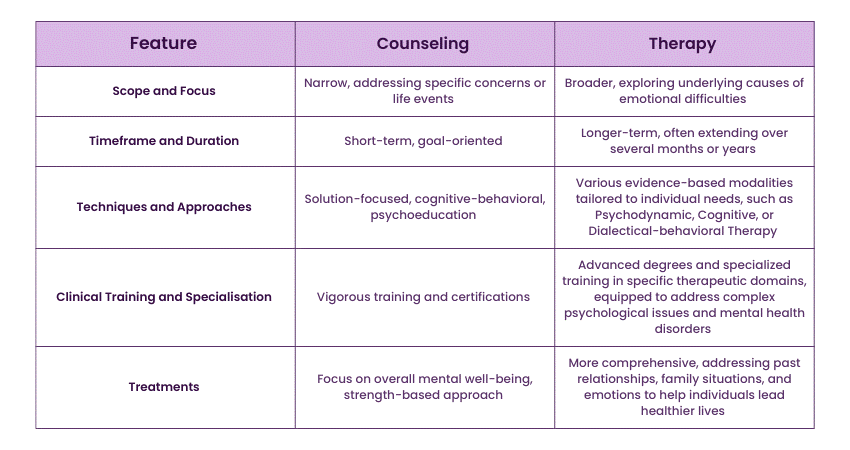We may not have the course you’re looking for. If you enquire or give us a call on 01344203999 and speak to our training experts, we may still be able to help with your training requirements.
Training Outcomes Within Your Budget!
We ensure quality, budget-alignment, and timely delivery by our expert instructors.

Unsure if you need counselling or therapy?When facing emotional challenges, it is essential to ask the most fundamental questions that bamboozle our mind. Its important to recognise that seeking professional assistance is a positive step towards self-care and growth. However, deciding between Counselling and Therapy can be confusing due to their overlapping nature.
According to NHS, approximately 1.94 million people were referred for talking therapies by the end of June 2024, a 7.15 % increase from 2022. In this blog, you will learn about the Differences Between Counselling and Therapy, the qualifications required, and the most suitable psychotherapy based on your needs and goals. Let’s amplify this journey forward!
Table of Contents
1) What is Counselling?
2) What is Therapy?
3) What Are the Differences Between Counselling and Therapy?
4) Qualifications Required for Each Type of Specialists
5) What Type of Counselling or Therapy Will Be Best for You?
6) Conclusion
What is Counselling?
Counselling is a type of psychotherapy that focuses primarily on providing support, guidance, and problem-solving techniques to individuals suffering from the specific issues or life events. The forms of Counselling depend on the needs and requirements of the particular type of Mental Health Illness.

Counselling is typically a short-term approach that helps clients explore their thoughts and feelings, gain insight, and develop strategies to cope with various types of mental health issues. Its sessions often revolve around specific topics such as:
1) Grief
2) Relationship problems
3) Career choice
4) Stress management
In some of these sessions, the therapist may ask you to visit personally, with your significant partner, or even with family members, depending on the nature of the counselling. These sessions cover several aspects, such as individual relationships, childhood trauma, feelings, thoughts, behaviour, past and present, and situations that make you uncomfortable.
What is Therapy?
Therapy, in contrast, is a broader and more in-depth approach that aims to address long-standing patterns, emotional difficulties, and various Mental Health disorders. Even if you don’t have suffered from any Mental Health disorders you can still consult a therapist to enhance your overall well-being and attain relaxation and peace of mind. Moreover, you can also prevent various kinds of self-destructive thoughts and actions through the Therapy process.

Therapists use evidence-based techniques to empower their personal growth and improve overall well-being. They help in alleviating symptoms for the conditions like:
a) Anxiety
b) Depression
c) Trauma
Furthermore, therapy sessions tend to be longer-term and offers a comprehensive exploration of an individual's thoughts, emotions, and behaviours. Therapists can also ask you to detail the events or instances which piqued your negative feelings. They may go even farther and ask about your family members and their behaviours towards you.
Conquer stress and build resilience for a more balanced and fulfilling life with our Handle Stress and develop your Resilience Course. Sign up now!
What are the Differences Between Counselling and Therapy?
While Counselling and Therapy share the common goal of supporting individuals in their mental and emotional well-being, there are several key differences which set them apart. Below, we have described the differences between Counselling and Therapy:

1) Scope and Focus
Counselling focuses on the narrower aspect by addressing specific concerns or life events. It delivers practical tools and strategies to help individuals handle immediate challenges with ease and smoothly. On the other hand, Therapy takes a broader approach by exploring the underlying causes of emotional difficulties and then working to hinder the cause and propel the individual’s life towards long-term personal growth.
2) Timeframe and Duration
Counselling is typically short-term and goal-oriented, with fewer sessions that focus primarily on immediate and emergency issues. Therapy, in contrast, is a more comprehensive approach that involves a longer commitment, often extending over several months or even years. It allows individuals to explore their past, relationships, and behaviour patterns.
3) Techniques and Approaches
Counselling makes use of solution-focused techniques, cognitive-behavioural strategies, and psychoeducation to help individuals overcome specific kinds of issues. While, Therapy incorporates various evidence-based modalities tailored to the individual's needs, ranging from Psychodynamic Therapy to Cognitive or Dialectical-behavioural Therapy (CBT).
4) Clinical Training and Specialisation
While both Counselling and Therapy professionals undergo vigorous training and certifications, Therapists often possess advanced degrees and specialised training in specific therapeutic domains. These Psychology-based professionals are equipped to address complex psychological issues and Mental Health disorders, while Counselors have a narrower focus on specific areas of expertise or life events.
5) Counselling Treatments
These Counselling treatments focus heavily on your overall mental well-being and not just treating disorders. Among them, the Clinical Mental Health counsellors take a more strength-based approach. This signifies that the treatment is focused on your unique strengths and abilities.
6) Therapy Treatments
These Therapy treatments are more comprehensive than Counselling sessions. The licensed Therapists may ask you to discuss your past relationships, your family situations, and most importantly, your feelings and emotions that have caused this Mental Illness. The goal of Therapy is to provide you with the rely on your symptoms and help you lead a healthier and more fulfilling life. There are different techniques that are used for different Mental Health issues.
Qualifications Required for Each Type of Specialists
Even though the qualifications of therapists and counsellors may sometimes overlap, there are some differences between the qualifications for each specialist. These differences are described below:
Qualifications Required to Become a Counsellor
The qualifications required to become a Counsellor are:
1) At least a Bachelor's in Psychology, Counselling, or any other related field. Having a master’s degree will be an added advantage.
2) They must undergo Specialised certification and training before they are fit to provide any sessions. There are different types of Counselling, such as marriage, family, school guidance, etc. The training for each type of Counselling is different and requires separate expertise to handle different situations.
3) Excellent grasp of communication. If Counselors cannot effectively communicate with their patients and vice versa, then they cannot provide the necessary solutions to their problems.
4) Constantly remain updated with the recent news or information pertaining to the field of psychology.
Qualifications Required to Become a Therapist
Here are the qualifications necessary to become a therapist. These are as follows:
a) A master's or doctorate in the same field or in Counselling. In addition, there are a greater number of courses for them, which include Cognitive Behavioral Therapy (CBT) and Dialectical Behavior Therapy (DBT).
b) License to practice. The requirements for all these licenses vary from state to state and country to country. Therapists also need to undergo licensing exams before they start their practice.
c) If you want to become a Therapist who deals with trauma and other cognitive behaviour disorders, you require specialised training and certifications.
Empower yourself with professional psychological tools with our Psychological Skills Training for Human Wellness Training – join today!
What Type of Counselling or Therapy Will be Best for You?
There are various types of Therapies or Counselling that you can undergo. However, not all Therapies or Counselling sessions are applicable to each individual. Typically, the kind of Therapy or Counselling session is dependent on the individual’s situations, past scenarios, relationships, family situations, etc. It's important to know that every individual is different and have diverse psychotherapy requirements. Therefore, the extremity of the problems will differ from one person, and so as the choice for Psychotherapy.
Become an expert in Anxiety Management techniques- join our Anxiety Courses today!
Conclusion
We hope you understand the Differences Between Counselling Vs Therapy. When deciding between Counselling and Therapy, it's important to consider your specific needs and goals. While Counselling is ideal for addressing immediate challenges, Therapy offers a more in-depth and comprehensive exploration to resolve long-standing emotional issues. It's important that you choose wisely and take consultations based on your unique circumstances.
Unlock the power of effective Counselling techniques with our transformative Counselling Training- sign up today!
Frequently Asked Questions

Yes, therapy tends to be more expensive than counselling. Typically, therapy sessions can range from £50 to £100 per 50-minute session, while counselling sessions often cost between £40 to £70. The price depends widely on the therapist's qualifications and the complexity of the treatment provided.

The cost can vary depending on the therapy type and therapist you choose, with typical in-person therapists charging around £50-£80 per hour. There are a few that may even charge £48 per hour, depending on their level of expertise. It's advisable to consult with your nearest mental health clinic for an accurate price estimate.

The Knowledge Academy takes global learning to new heights, offering over 30,000 online courses across 490+ locations in 220 countries. This expansive reach ensures accessibility and convenience for learners worldwide.
Alongside our diverse Online Course Catalogue, encompassing 19 major categories, we go the extra mile by providing a plethora of free educational Online Resources like News updates, Blogs, videos, webinars, and interview questions. Tailoring learning experiences further, professionals can maximise value with customisable Course Bundles of TKA.

The Knowledge Academy’s Knowledge Pass, a prepaid voucher, adds another layer of flexibility, allowing course bookings over a 12-month period. Join us on a journey where education knows no bounds.

The Knowledge Academy offers various Mental Health Courses, including Counselling Course, Psychological Skills Training for Human Wellness, and Anxiety Courses. These courses cater to different skill levels, providing comprehensive insights into A Detailed Overview on Psychological Disorders.
Our Health & Safety Blogs cover a range of topics related to workplace safety and compliance, offering valuable resources, best practices, and industry insights. Whether you are a beginner or looking to advance your safety management skills, The Knowledge Academy's diverse courses and informative blogs have got you covered.
Upcoming Health & Safety Resources Batches & Dates
Date
 Counselling Masterclass
Counselling Masterclass
Fri 7th Feb 2025
Fri 4th Apr 2025
Fri 6th Jun 2025
Fri 8th Aug 2025
Fri 3rd Oct 2025
Fri 5th Dec 2025







 Top Rated Course
Top Rated Course



 If you wish to make any changes to your course, please
If you wish to make any changes to your course, please


